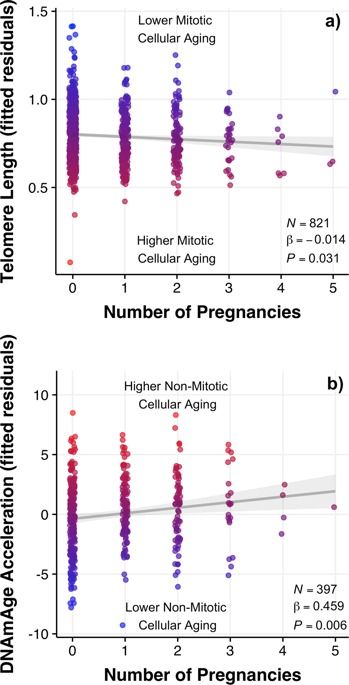Evolutionary theory predicts that reproduction entails costs that detract from somatic maintenance, accelerating biological aging. Despite support from studies in human and non-human animals, mechanisms linking ‘costs of reproduction’ (CoR) to aging are poorly understood. Human pregnancy is characterized by major alterations in metabolic regulation, oxidative stress, and immune cell proliferation. We hypothesized that these adaptations could accelerate blood-derived cellular aging. To test this hypothesis, we examined gravidity in relation to telomere length (TL, n = 821) and DNA-methylation age (DNAmAge, n = 397) in a cohort of young (20–22 year-old) Filipino women. Age-corrected TL and accelerated DNAmAge both predict age-related morbidity and mortality, and provide markers of mitotic and non-mitotic cellular aging, respectively. Consistent with theoretical predictions, TL decreased (p = 0.031) and DNAmAge increased (p = 0.007) with gravidity, a relationship that was not contingent upon resource availability. Neither biomarker was associated with subsequent fertility (both p 0.3), broadly consistent with a causal effect of gravidity on cellular aging. Our findings provide evidence that reproduction in women carries costs in the form of accelerated aging through two independent cellular pathways.
Aug 4, 2018
Reproduction predicts shorter telomeres and epigenetic age acceleration among young adult women
Posted by Manuel Canovas Lechuga in categories: biotech/medical, genetics, life extension
Read more









Comments are closed.